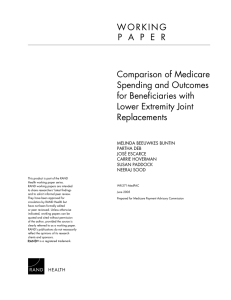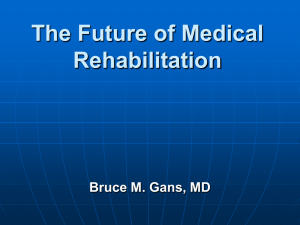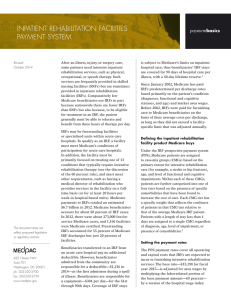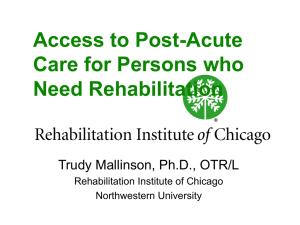One-Pager for PAC Reform (June 2015) Revised
advertisement
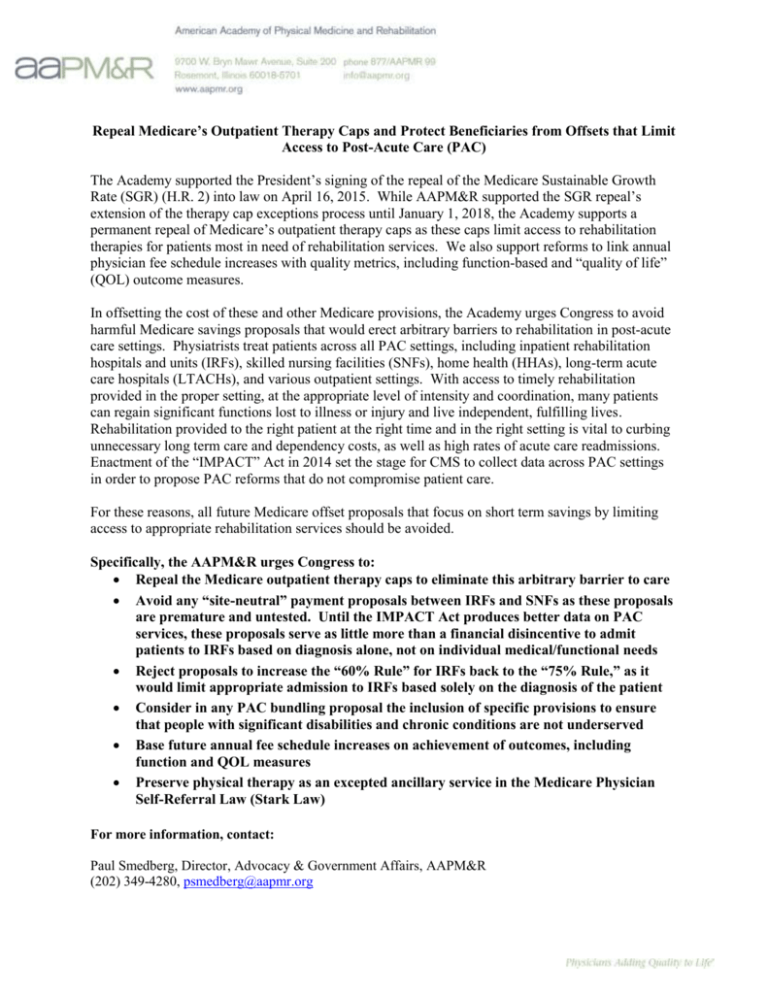
Repeal Medicare’s Outpatient Therapy Caps and Protect Beneficiaries from Offsets that Limit Access to Post-Acute Care (PAC) The Academy supported the President’s signing of the repeal of the Medicare Sustainable Growth Rate (SGR) (H.R. 2) into law on April 16, 2015. While AAPM&R supported the SGR repeal’s extension of the therapy cap exceptions process until January 1, 2018, the Academy supports a permanent repeal of Medicare’s outpatient therapy caps as these caps limit access to rehabilitation therapies for patients most in need of rehabilitation services. We also support reforms to link annual physician fee schedule increases with quality metrics, including function-based and “quality of life” (QOL) outcome measures. In offsetting the cost of these and other Medicare provisions, the Academy urges Congress to avoid harmful Medicare savings proposals that would erect arbitrary barriers to rehabilitation in post-acute care settings. Physiatrists treat patients across all PAC settings, including inpatient rehabilitation hospitals and units (IRFs), skilled nursing facilities (SNFs), home health (HHAs), long-term acute care hospitals (LTACHs), and various outpatient settings. With access to timely rehabilitation provided in the proper setting, at the appropriate level of intensity and coordination, many patients can regain significant functions lost to illness or injury and live independent, fulfilling lives. Rehabilitation provided to the right patient at the right time and in the right setting is vital to curbing unnecessary long term care and dependency costs, as well as high rates of acute care readmissions. Enactment of the “IMPACT” Act in 2014 set the stage for CMS to collect data across PAC settings in order to propose PAC reforms that do not compromise patient care. For these reasons, all future Medicare offset proposals that focus on short term savings by limiting access to appropriate rehabilitation services should be avoided. Specifically, the AAPM&R urges Congress to: Repeal the Medicare outpatient therapy caps to eliminate this arbitrary barrier to care Avoid any “site-neutral” payment proposals between IRFs and SNFs as these proposals are premature and untested. Until the IMPACT Act produces better data on PAC services, these proposals serve as little more than a financial disincentive to admit patients to IRFs based on diagnosis alone, not on individual medical/functional needs Reject proposals to increase the “60% Rule” for IRFs back to the “75% Rule,” as it would limit appropriate admission to IRFs based solely on the diagnosis of the patient Consider in any PAC bundling proposal the inclusion of specific provisions to ensure that people with significant disabilities and chronic conditions are not underserved Base future annual fee schedule increases on achievement of outcomes, including function and QOL measures Preserve physical therapy as an excepted ancillary service in the Medicare Physician Self-Referral Law (Stark Law) For more information, contact: Paul Smedberg, Director, Advocacy & Government Affairs, AAPM&R (202) 349-4280, psmedberg@aapmr.org





